My followers on twitter probably know I’m a huge fan of Mark Suster, a 2-times entrepreneur turned VC based in Los Angeles, who blogs to share his knowledge on Both sides of the Table. BTW, you should definitely follow him if you’re an entrepreneur! Mark had a great post last week named Why you should give before you get. And Brad Feld, entrepreneur, angel and VC that you’ve certainly have heard about, even made “give before you get” his life motto.
It sounds to be common sense in my ears, but it’s often not for many people out there. Everyone advises you to go networking. But what is really networking? Is it only exchanging visit cards or shaking hands? No. And the stupidest thing you can do online is to add people you don’t know on LinkedIn without telling the other person WHY. Or because you just want to “extend your network”. Everyone’s time is scarce, so introduce yourself and try to be interesting (…). I’m not famous. I’m not hunted. But I get many weekly LinkedIn invitations anyway. My standard answer when I don’t know the other person is “remember me where we’ve met… or how can I help you?”. And I’m always shocked that more than half people never answer.
Again, what is networking? It’s building relationships. And it takes time. Relationships are not asking, getting and going away. It’s bidirectional. And on the long run. Fred Wilson, a NYC-based VC, expressed in June last year that “relationships are the currency of business”. I couldn’t stop nodding as I read this. What remains on the long run is not your position or (impression of) power you currently have. It’s the true relationships you’ve built. People will forget the role you had. But will never forget what you did for them.
So the best philosophy you need to have when you’re meeting people is to think about what you can bring to the other person (at least for business-related meetings). Always try to bring value. Do follow-ups. And keep promises – there isn’t a worse impression that people who promise many things, but don’t even do a single email.
But what the Return on Investment you get for helping other? You often don’t get direct benefits. But you’re building true relationships with people and also create kind of a personal brand. Which can only bring you amazing things back on the long run.
And have you already heard about the “Pay it forward” philosophy? It means that the support/help you’re bringing someone will probably get paid back by a third-party. So, someone will “pay the bill” for the guy you’ve helped once. But how can I be certain to be rewarded? You can’t. The biggest problem in European startup ecosystems seems that the concept isn’t spread/accepted enough. But that’s an excuse: Being supportive and helpful is a state of mind, not a strategy. What are you waiting for to go helping other?

